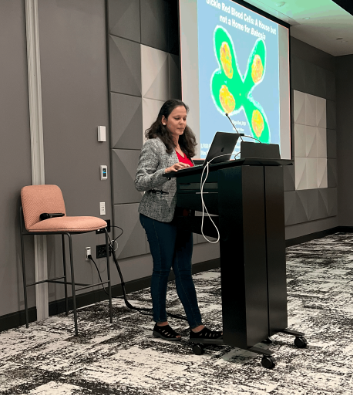Retreat highlights the contributions made by the next generation of ‘leaders-in-training’
The Lindsley F. Kimball Research Institute (LFKRI) of New York Blood Center Enterprises (NYBCe) proudly hosted its inaugural Research Retreat on Thursday, November 21, 2024. It was a momentous event showcasing 17 postdoctoral researchers and staff scientists’ presentations of their latest scientific advancements and updates. The event, held in celebration of the institution’s 50th anniversary in 2024, provided a dynamic platform for the next generation of researchers at LFKRI to share their work, exchange ideas, and engage in meaningful discussions that underscore the world-class level of research at the institute.

Commitment to Excellence
The Research Retreat exemplified LFKRI’s ongoing commitment to scientific excellence, fostering an environment where emerging scientists can thrive and contribute to groundbreaking discoveries. From molecular biology and immunology to transfusion medicine and epidemiology research, the trainees presented a wide range of innovative research that exemplifies LFKRI’s standard of high-caliber scientific inquiry as a hub for cutting-edge scientific research in benign hematology over the past six decades.
“The inaugural Research Retreat is a testament to the extraordinary talent and passion of the researchers we support here at LFKRI,” said Dr. Karina Yazdanbakhsh, Vice President and Director of Research at LFKRI.
“As we celebrate both our 50th anniversary of LFKRI and our 60th anniversary of NYBC this year, we should highlight the contributions made by the next generation of ‘leaders-in-training’ here at LFKRI, who are at the forefront of advancing knowledge in their respective fields,” said Dr. Larry Luchsinger, Senior Vice President, and Chief Scientific Officer.
Research Collaboration
Throughout the day, participants presented their research progress, discussed challenges and opportunities, and received valuable feedback from peers, senior scientists, and faculty members. The event also included periods for LFKRI staff to interact with one another and discuss potential collaboration.

Dr. Divya Beri, a postdoctoral researcher in the laboratory of Blood Borne parasites at LFKRI, shared her work on how the altered metabolic state of sickle red blood cells makes them a poor host for infections with transfusion-transmitted parasites such as Babesia with implications for identifying potential biochemical pathways that can be targeted for therapeutic interventions in both healthy people and patients with sickle cell disease. “The Research Retreat has been an invaluable opportunity to showcase our work and engage with fellow researchers who share similar passions,” she said. “Being part of an institute that fosters such a collaborative and supportive environment is truly inspiring.”
As the retreat concluded, attendees expressed enthusiasm about the opportunity to continue sharing ideas and building collaborative networks within the LFKRI community. With plans to make the Research Retreat a recurring event, LFKRI is committed to continuing its tradition of fostering scientific discovery and supporting the growth and success of its researchers.